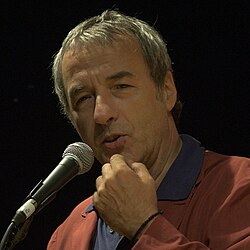David Riondino
David Riondino | |
|---|---|
 | |
| Background information | |
| Birth name | Danod Riondino |
| Born | 10 June 1952 |
| Origin | Florence, Italy |
| Occupations |
|
| Instruments |
|
| Years active | 1974–present |
| Website | www.davidriondino.com |
David Riondino (born 10 June 1952) is an Italian singer-songwriter, actor, comedian, writer, playwright, screenwriter, director and composer.
Life and career
[edit]Born in Florence, Italy, the son of a teacher, Riondino started his career in the mid-1970s as a member of the musical ensemble Collettivo Victor Jara.[1][2] In 1979 he made his solo debut with the album David Riondino, and the same year he was the opening act in a series of concerts by Fabrizio De André and Premiata Forneria Marconi, including those in Florence and Bologna, where De Andre's very famous live album Fabrizio De André in concerto - Arrangiamenti PFM was recorded.[1][2] In 1980, following his second album, Boulevard, with arrangements by Shel Shapiro, he focused on his live activity, where he mixed improvisation, music and cabaret.[1]
Starting from the second half of the 1980s Riondino enjoyed a large success thanks to the semi-regular participation to the Canale 5 show Maurizio Costanzo Show, where he used to improvise surreal songs imitating the style of the Brazilian singer-songwriters.[1][2][3] In 1987 he released his third album Tango dei miracoli, whose booklet was illustrated by Milo Manara.[1]
Riondino's variagated career includes films, TV series, comedy plays as well as novels, poems and several collaborations with newspapers and magazines as a humorist and a semi-serious columnist.[1][2][3]
Filmography
[edit]- To Love the Damned (1980)
- The Night of the Shooting Stars (1982)
- Kamikazen: Last Night in Milan (1987)
- Zanzibar (TV, 1988)
- Cavalli si nasce (1988)
- La cattedra (1991)
- Ilona Arrives with the Rain (1996)
- Cuba Libre – Velocipedi ai tropici (1997, also director)
- Donna selvaggia (1998)
- Vado e torno (TV, 1998)
- L'erba proibita (2002)
- Viva Zapatero! (2005)
- L'uomo che aveva picchiato la testa (2009)
- Amici miei – Come tutto ebbe inizio (2011)
- The Invisible Player (2016)
Discography
[edit]- 1979 – David Riondino (Ultima Spiaggia, ZPLS 34061)
- 1980 – Boulevard (RCA Italiana, PL 31547)
- 1987 – Tango dei miracoli (L'ALTernativa, ALT 003)
- 1989 – Racconti picareschi (CGD, CGD 20932)
- 1991 – Non svegliate l'amore (CGD, CGD 9031 74383-1)
- 1994 – Temporale (CGD, CGD 4509 96185-2)
- 1995 – Quando vengono le ballerine? (Rossodisera Records-Sony, RDS 480351)
Books
[edit]- Rombi e milonghe. João Mesquinho e altre canzoni. Feltrinelli, 1993. ISBN 88-07-81231-2.
- Viaggio a Cuba, with Valerio Peretti Cucchi. Zelig, 1997. ISBN 88-86471-49-1.
- Epos 92–97. L'Italia in terzine da Tangentopoli all'Ulivo, Grugliasco, Edizioni Arti grafiche San Rocco, 1998. ISBN 88-900156-1-6.
- Rumba. Itinerari cubani al ritmo della capitale, con Roberto Perini, Milano, Lizard, 1999. ISBN 88-86456-70-0.
- Dante Inferno, with Sandro Lombardi, con CD, Milano, Garzanti, 2002. ISBN 88-11-12007-1.
- Cantata dei pastori immobili. Racconto di un presepe vivente, illustrations by Sergio Staino. Donzelli, 2004. ISBN 88-7989-900-7.
- John Martin. Il trombettiere di Apricale. Da Garibaldi a Custer, with Claudio Nobbio. Fratelli Frilli, 2007. ISBN 978-88-7563-312-7.
- Firenze. Effequ, 2013. ISBN 978-88-89647-85-1.
References
[edit]- ^ a b c d e f Andrea Terrinoni. "David Riondino". Gino Castaldo (edited by). Dizionario della canzone italiana. Curcio Editore, 1990. pp. 1470–1.
- ^ a b c d Enrico Deregibus (8 October 2010). Dizionario completo della Canzone Italiana. Giunti Editore, 2010. pp. 397–8. ISBN 978-8809756250.
- ^ a b Eddy Anselmi (2009). Festival di Sanremo: almanacco illustrato della canzone italiana. Panini Comics, 2009. p. 873. ISBN 978-8863462296.
External links
[edit]- Official website
- David Riondino at IMDb
- David Riondino discography at Discogs
- 1952 births
- Living people
- Writers from Florence
- Italian male comedians
- Italian male stage actors
- Italian male film actors
- Italian male television actors
- Italian composers
- Italian male singer-songwriters
- Italian singer-songwriters
- Italian comedy musicians
- Musicians from Florence
- Male actors from Florence
- Comedians from Florence
